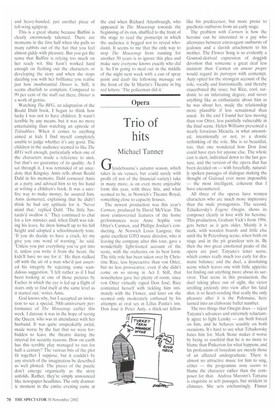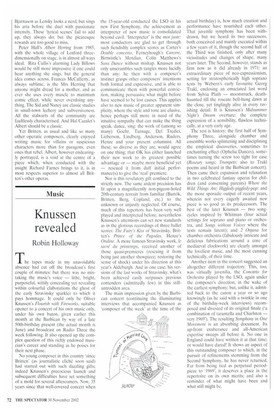Trio of hits
Michael Tanner
Glyndebourne's autumn season, which takes in six venues, but could surely with profit (if not of the financial variety) take in many more, is on even more enjoyable form this year, with three hits, and what seemed to be, in Norwich's Theatre Royal, something close to capacity houses.
The newest production was this year's Carmen, produced by David McVicar. The most controversial features of the home performances were Anne Sophie von Otter's Carmen, and Phillipe Jordan's conducting. At Norwich Louis Langree, the quite excellent GTO music director, who is leaving the company after this tour, gave a wonderfully light-footed account of the score, with the orchestra on its best form. The title role has been taken over by Christine Rice, less hyperactive than von Otter, but no less provocative, even if she didn't come on so strong in Act I. Still, that nonetheless gave her plenty of room, since von Otter virtually raped Don Jose; Rice contented herself with tickling him intimately with the Flower, and later on she seemed only moderately enthused by his attempts at oral sex in Lillas Pastia's inn. Don Jose is Peter Auty, a thick-set fellow like his predecessor, but more prone to psychotic outbursts from an early stage.
The problem with Carmen is how the heroine can be interested in a guy who alternates between extravagant outbursts of jealousy and a slavish attachment to his mother, The Flower Song is so evidently a Gounod-derived expression of doggish devotion that someone a great deal less insistent than Carmen on amour propre would regard its purveyor with contempt. Auty opted for the strongest account of the role, vocally and histrionically, and thereby exacerbated the issue; but Rice, cool, sardonic to an infuriating degree, and never anything like as enthusiastic about him as he was about her, made the relationship more plausible if less sensational than usual. In the end I found her less moving than von Otter, less painfully vulnerable in the final scene. Helen Williams presented a nearly ferocious Micaela, in what amounted, intentionally or not, to a drastic rethinking of the role, She is so beautiful, too, that one wondered how Don Jose could have eyes for anyone else. The whole cast is alert, individual down to the last gesture, and the version of the opera that has been decided on — with forcefully, naturally spoken passages of dialogue making the thought of Guiraud ever more impossible — the most intelligent, coherent that I have encountered, All three of the operas have women characters who are much more impressive than the male protagonists. The second, Tchaikovsky's Eugene Onegin, shows its composer clearly in love with his heroine. This production. Graham Vick's from 1994, gets better as it gets older. Mainly it is stark, with wooden boards and little else until the St Petersburg scene, when both on stage and in the pit grandeur sets in. By then the two great emotional peaks of the opera arc past: Tatyana's letter scene, which comes really much too early for dramatic balance; and the duel, a desolating scene which leaves one with little appetite for finding out anything more about its survivor, That scene in this production, the duel taking place out of sight, the victor strolling joylessly into view after his fatal shot, is so heart-rending that really the only pleasure after it is the Polonaise, here turned into an elaborate ballet number.
The two things that Onegin does — reject Tatyana's advances and extremely reluctantly agree to fight Lensky — are both forced on him, and he behaves sensibly on both occasions. It's hard to see what Tchaikovsky hates him for. Mark Stone makes it worse by being so youthful that he is no more to blame than Pinkerton for what happens, and his professions of boredom are merely those of an affected undergraduate. There is almost no attractive music for him to sing, either — the programme note seems to blame the character rather than the composer for that. Andrea Maronn's Tatyana is exquisite in soft passages, but strident in climaxes. She acts enchantingly. Finnur
Bjarnason as Lensky looks a nerd, but sings his aria before the duel with passionate intensity. These 'lyrical scenes' fail to add up, they always do; but the picaresque rewards are too good to miss.
Peter Hall's Albeit Herring from 1985, with the whole village of Loxford threedimensionally on stage, is in almost all ways ideal. Rita Cullis's alarming Lady Billows would be still more impressive if one could hear anything she sings, but the general idea comes across. Frances McCafferty, as always sublime, is the Mrs Herring that anyone might dread for a mother, and as ever she uses every muscle to maximum comic effect, while never overdoing anything. The Sid and Nancy are classic studies in small-town lechery and subversiveness. All the stalwarts of the community are faultlessly characterised. And Hal Cazalet's Albert should be a classic.
Yet Britten, as usual and like so many other operatic composers, clearly enjoyed writing music for villains or suspicious characters more than for paragons, even ones that rebel. Albert, however endearingly portrayed, is a void at the centre of a piece which, when conducted with the insight Richard Fames brings to it, is in most respects superior to almost all Britten's other operas.



























































































 Previous page
Previous page